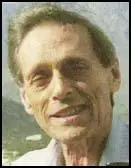Ronald Segal

Ronald Segal was born into an extremely wealthy Jewish family in South Africa on 14th July 1932. After he attended Sea Point Boys' High School he studied English and Latin at Cape Town University. Later he did a further degree at Trinity College, Cambridge.
On his return to South Africa in 1956 Segal launched Africa South. He used the magazine to campaign against the racist policies of the South African government. Over the next few years Segal became a leading figure in the anti-apartheid movement.
Segal went on a speaking tour of the United States where he argued for an economic boycott of South Africa. He also raised funds for the African National Congress and the defence fund of Nelson Mandela and others on trial for treason in Pretoria.
After the Sharpeville Massacre in 1960 the government introduced a state of emergency and began imprisoning anti-apartheid activists. Segal and Oliver Tambo managed to escape to England. Segal continued to publish Africa South until the government was able to cut off the money supply from his family in South Africa.
Segal was the author of several books including Political Africa (1961), African Profiles (1962), Into Exile (1963), Race War: The Worldwide Conflict of Races (1966), America's Receding Future (1968), The Struggle Against History (1974), Decline and Fall of the American Dollar (1974), Southern Africa: New Politics of Revolution (1976), The Tragedy of Leon Trotsky (1983) and The New State of the World Atlas (1984).
Segal, along with his South-African friends based in England, including Oliver Tambo and Joe Slovo, continued to campaign for the release of Nelson Mandela.
In 1982 Segal's close friend, Ruth First, was killed by a parcel bomb. In recognition of her work Segal established the Ruth First Memorial Prize for journalism.
After Segal was finally unbanned by the South African government and received a hero's welcome when he returned to his homeland in 1992. He published Islam's Black Slaves: The Other Black Diaspora in 2002.
Ronald Segal died of cancer on 23rd February 2008.
Primary Sources
(1) Denis Herbstein, The Guardian (26th February 2008)
Ronald Segal, founder of the Penguin African Library and author of several groundbreaking works on international affairs, has died of cancer, aged 75. His unwavering support for the anti-apartheid struggle reached a dramatic apogee during the state of emergency in 1960 when he crossed the South African border into exile with the African National Congress leader, Oliver Tambo. But if he pinned his colours to the liberation movement throughout the hard years of exile, blind acceptance of the party line was not his style.
At an early age he had proclaimed himself a socialist, saying he did not want to be a millionaire. But he had no choice. His father was a co-owner of Ackerman's, the giant cheap clothing chain. At their home on the slopes of Cape Town's Lion's Head, his Zionist parents entertained visiting dignitaries. At eight, he read Gone With the Wind and a biography of Disraeli. Relatives thought him precocious; on being berated by an uncle for spending the sixpence he had been given on sweets, Segal asked if he was expected to invest in property...
Segal had access to a family trust, for advertising would be difficult, and he could expect no support from his late father's business friends. Africa South arrived at a dangerous time, ruffling the feathers of a regime that brooked less and less criticism. It gave a voice to communists, socialists, liberals (Alan Paton was one), the church and people of no known ideology. It was not scared of sacred cows. Economic sanctions, slave labour on white-owned farms, the status of South-West Africa, revolution - all were investigated or recommended. He was a man of opinions, but not opinionated. His editorials were trenchant but full of common sense. He was harsh on the Soviet invasion of Hungary.
He became a marked man, not helped by a speaking tour of US campuses, where he argued with passion for an economic boycott. Eleanor Roosevelt spoke at a fundraising event for Nelson Mandela and others on trial for treason in Pretoria - Segal ran the defence fund in Cape Town. His arrest one night in an African township, with a gun and pamphlets calling for a boycott of Afrikaner businesses, did not help. His car was torched. He lost his passport and was (somewhat ironically) banned as a "communist", making it a criminal offence to associate with other people.
(2) Ronald Segal, speech on the death of Ruth First in 1982.
Ruth First's life was essentially a political act. And her death was, of course, a political act as well, of a hideously different kind. She would have wanted our celebration of her life, and our grief and our rage at her murder, to be, above all, a political act. We will not disappoint her. Let those who killed her know that if their motive was to intimidate or dismay us, we are not to be intimidated or dismayed. Indeed: those of us who were falling asleep have been aroused, those of us who were growing tired have been reinvigorated; those of us who have been separately leading our own lives have been made aware again of where together our lives should lead. The revolutionary movement, to which she gave so much of herself, will find in us only a reinforcement of purpose, of resources and of effort.
